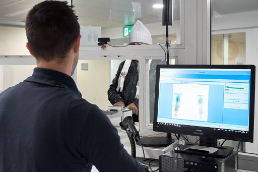
Once they have lodged an asylum claim, all asylum seekers are allocated to one of the federal asylum centre with processing facilities. First the asylum seeker is identified and it is established whether Switzerland is responsible for conducting the asylum procedure. Then, in a preparatory phase lasting up to three weeks, the asylum seeker’s personal details are recorded; fingerprints are taken and compared with Eurodac, the European fingerprint database; it is asked how the asylum seeker reached Switzerland; a health-check carried out and if necessary, the asylum seeker’s age is assessed and a DNA analysis conducted.
Eurodac
Eurodac is the central fingerprint database of the European Union for asylum matters. It has been operating since 15 January 2003 and was set up in order to register asylum applicants and thus apply the Dublin Regulation effectively.
All asylum applicants who are at least 14 years old and are not citizens of a Dublin member state are registered in Eurodac. It also contains details of persons who are caught illegally crossing the borders of the Dublin Area and are not turned back. Eurodac may also be used to check persons who are illegally present in a Dublin member state.
Legal protection
At the beginning of the asylum procedure, all asylum seekers receive free legal advice about their rights and obligations. They are also offered the free services of a lawyer, who informs them of their chances of obtaining asylum. The lawyer provides support at each stage of the asylum procedure, takes part in hearings, responds to the draft of any negative asylum decision and if necessary draws up an appeal.
Advice and support in case of removal
Asylum seekers with little chance of being granted asylum in Switzerland are informed early on about the possibility of returning to their country of origin voluntarily. There is a return counselling service that helps people to organise their return and may provide financial support to help them reintegrate into life in their country of origin. Support is provided on a diminishing scale: the later an asylum seeker decides to return home voluntarily, the less financial help they receive. The status of their asylum procedure and the length of time they have spent in Switzerland are also taken into account.
Last modification 01.03.2019


